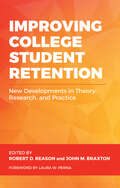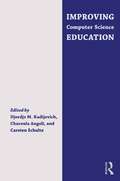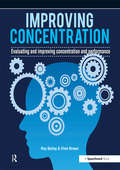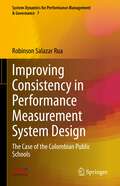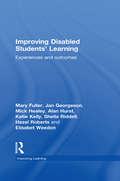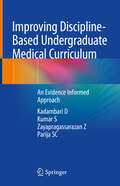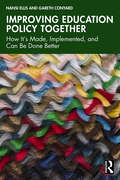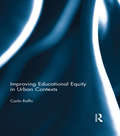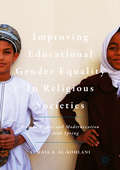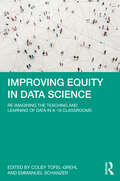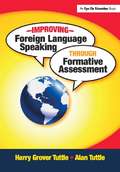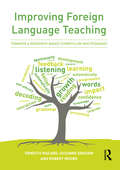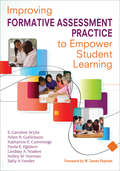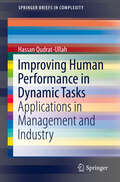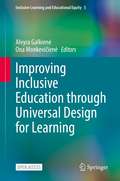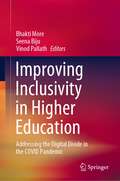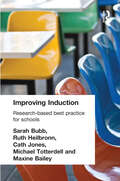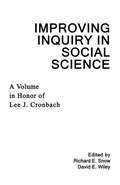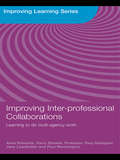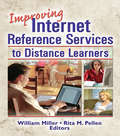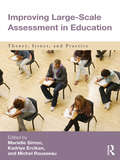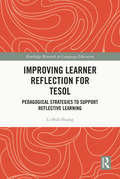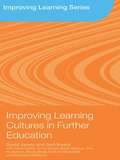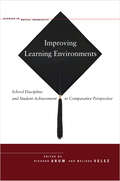- Table View
- List View
Improving College Student Retention: New Developments in Theory, Research, and Practice
by Robert D. Reason, John M. BraxtonHigher education institutions have already begun to see decreasing enrollment numbers, even as higher education enrollment is predicted to drop precipitously starting in 2025. Much of the decrease in enrollment will be driven by demographic trends about which higher education institutions can do little, making the retention of students who do enroll that much more important. Overall retention rates have stagnated and differential retention rates by race and ethnicity have persisted. If higher education institutions, researchers, and policy makers are to improve retention rates, a critical examination of the current state and future directions of retention research is essential.This edited volume begins that examination by addressing several questions: What are the needed directions in theory and research on college student persistence and how do we translate new theory and research into effective practices? Are we asking the right questions, looking in the right places, or trying to apply out-of-date theories to new populations? In short, how can the research community help institutions improve retention in this challenging time?
Improving Computer Science Education
by Charoula Angeli Djordje M. Kadijevich Carsten SchulteImproving Computer Science Education examines suitable theoretical frameworks for conceptualizing teaching and learning computer science. This highly useful book provides numerous examples of practical, "real world" applications of major computer science information topics, such as: • Spreadsheets• Databases• Programming Each chapter concludes with a section that summarzies recommendations for teacher professional development. Traditionally, computer science education has been skills-focused and disconnected from the reality students face after they leave the classroom. Improving Computer Science Education makes the subject matter useful and meaningful by connecting it explicitly to students' everyday lives.
Improving Concentration: A Professional Resource for Assessing and Improving Concentration and Performance
by Roy BaileyImproving Concentration has been designed to help individuals improve their concentration skills. It is aimed primarily at those taking on a training role in relation to the individual concerned. However, it can also be used by the individuals themselves as a self-help resource. This resource will help trainers to convey to their students: an understanding of concentration how concentration works for them how to improve their concentration skills how to manage concentration in relation to their performance. This Psychological skills training resource is arranged in a format that is both easy to use and clear to follow. The activities can be used with both individual students and groups Part 1 'The knowledge base' outlines theoretical perspectives on concentration and describes the Bailey / Brown model of concentration. Part 2 'Pathways to improving concentration' explains and describes how the Bailey / Brown model of concentration can be used as a guide to raising awareness, understanding, monitoring and evaluating interventions aimed at improving concentration in people. Part 3 'The activities' in this resource can be used singly or combined as part of a structured intervention to improve an individual's concentration skills.
Improving Consistency in Performance Measurement System Design: The Case of the Colombian Public Schools (System Dynamics for Performance Management & Governance #7)
by Robinson Salazar RuaThis book analyzes behavioral distortions in public schools and delineates outcome-based performance measurement systems that can prevent and mitigate them. An instrumental view of dynamic performance management (DPM) is used to support the endeavor by identifying how performance drivers affect end results of outcome and output, how end results affect strategic resources, and how strategic resources and benchmarks define the dynamics of performance drivers. This approach is also used to promote a shift from an output-oriented to an outcome-oriented view in performance management, with the aim of achieving sustainable results in the long term. The book also includes a comprehensive literature review at the end of each chapter, intended to strengthen readers’ knowledge and encourage further research. Given its scope, the book will appeal to graduate students in public management, researchers in performance management, system dynamics, and education, and decision-makers in public schools.
Improving Disabled Students' Learning: Experiences and Outcomes (Improving Learning)
by Alan Hurst Sheila Riddell Hazel Roberts Elisabet Weedon Jan Georgeson Mary Fuller Mick Healey Katie KellyHow do disabled students feel about their time at university? What practices and policies work and what challenges do they encounter? How do they view staff and those providing learning support? This book sets out to show how disabled students experience university life today. The current generation of students is the first to move through university after the enactment of the Disability Discrimination Act, which placed responsibility on universities to create an inclusive environment for disabled students. The research on which the book is based focuses on a selected group of students with a variety of impairments, as they progress through their degree courses. On the way they encounter different styles of teaching and approaches to learning and assessment. The diversity of their views is reflected in the issues they raise: negotiating identities, dealing with transitions, encountering divergent and sometimes confusing teaching and assessment. Improving Disabled Students’ Learning goes on to ask university staff how they experience these new demands to widen participation and create more inclusive learning climates. It explores their perspectives on their roles in a changing university sector. Offering insights into the workings of universities, as seen by their central participants, its findings will be of great interest to all practitioners who teach and support disabled students, as well as campaigners for an end to discrimination. Crucially, it foregrounds the views of disabled students themselves, giving rise to a complex, contradictory and always fascinating picture of university life from students whose voices are not always heard.
Improving Discipline-Based Undergraduate Medical Curriculum: An Evidence Informed Approach
by Kadambari D Kumar S Zayapragassarazan Z Parija ScThe past few decades have seen the increasing use of evidence in all aspects of healthcare. The concept of evidence-informed healthcare began in the 1990s as evidence-informed practice, and has since become widely accepted. It is also accepted that the training of medical graduates must be informed by evidence obtained from educational research. This book utilizes an evidence-informed approach to improve discipline-based undergraduate medical curricula. Discipline-based undergraduate medical curricula represent a widely adopted choice for undergraduate medical education around the world. However, there have been criticisms leveled against the discipline-based approach. One of the shortcomings cited is that students are insufficiently equipped to meet the challenges of today’s healthcare. As a result, various strategies have been proposed. One option, currently in vogue, is the outcome-based approach, wherein the exit behaviors of medical graduates are explicitly examined and used to guide the educational process. The shortcomings present in discipline-based undergraduate medical curricula can be overcome by the strengths of these strategies. This book recommends improving discipline-based undergraduate medical curricula by combining several strategies, including the adoption of an outcome-based approach and the use of evidence-informed implementable solutions. The book is relevant for all faculty, administrators and policymakers involved in undergraduate medical education, and can also be used as a resource for faculty development.
Improving Education Policy Together: How It’s Made, Implemented, and Can Be Done Better
by Nansi Ellis Gareth ConyardBy focusing on the relationships involved, Improving Education Policy Together will change how policy-making in education is approached and showcase alternative models that will lead to more sustainable and effective practices. The authors analyse the state of educational policy-making in England. They particularly reflect on the relationships of the different people and organisations involved – policy-makers such as politicians, civil servants, and unions – and explain how these interact with the wider world. Building on the experiences of the authors on different sides of the process, the book explores the reasons why education policies fail the very sector they are intended to serve. By considering aspects of policy-making in different countries, the authors highlight more effective ways of building relationships between decision-makers and those affected by educational policy. This book explores, as an alternative, long term, systems-led, and relational policy-making, and maps out a range of unique models for change. Of interest to those involved in developing and influencing policy in government, this book will be essential reading for political parties, unions, civil servants, and charities, as well as teachers and leaders who believe they should be much more influential in the policies that affect their working lives and seek to adopt a better approach to making education policy.
Improving Educational Equity in Urban Contexts
by Carlo RaffoAn enduring educational concern that has plagued researchers and policy makers in a number of affluent countries is the endemic nature of educational inequalities. These inequalities highlight distinct differences in the educational skills, knowledge, capabilities and credentials between learners’ demographic characteristics. They also point to issues of educational disadvantage that emanate from a combination of factors including family life, communities, the geographies of space and place, gender and ethnicity. This book examines some of the causes and responses to educational inequalities, and focuses upon poor urban contexts where educational disadvantage is at its most concentrated, and where educational policy and practice has, over time, proliferated. It questions how wider inequities experienced by young people in urban contexts generate educational inequalities and disadvantage, detailing explicitly what an equitable approach to education might look like. Included in the book is an innovative educational equity framework and toolkit with illustrative policy and practice case studies, bringing together unique scholarship and analysis to examine future educational policy in a holistic, comprehensive and equitable way. It will be valuable reading for postgraduate students, researchers and policy makers with an interest in education and educational equity.
Improving Educational Gender Equality in Religious Societies: Human Rights And Modernization Pre-arab Spring
by Sumaia A. Al-KohlaniIn this book, Al-Kohlani examines fifty-five Muslim and non-Muslim countries from 1960 to 2010 in response to “religious theory” that associates certain religions with gender inequality and “modernization theory” which downplays the role of religion on gender inequity and associates gender inequality with socioeconomic factors. The author explores both schools of thought and posits that, on average, Muslim countries have lower educational equality in comparison to non-Muslim countries with less religious constitution. An interdisciplinary study drawn from the fields of world politics, public policy in education, and political religion, this book responds not only to debates within academia, but also to larger debates in society about the role of religion in the state, the specific challenges of the relationship of Islam and the public policies, and the relationship between constitution and gender equality.
Improving Equity in Data Science: Re-Imagining the Teaching and Learning of Data in K-16 Classrooms
by Colby Tofel-Grehl Emmanuel SchanzerImproving Equity in Data Science offers a comprehensive look at the ways in which data science can be conceptualized and engaged more equitably within the K-16 classroom setting, moving beyond merely broadening participation in educational opportunities. This book makes the case for field wide definitions, literacies and practices for data science teaching and learning that can be commonly discussed and used, and provides examples from research of these practices and literacies in action. Authors share stories and examples of research wherein data science advances equity and empowerment through the critical examination of social, educational, and political topics. In the first half of the book, readers will learn how data science can deliberately be embedded within K-12 spaces to empower students to use it to identify and address inequity. The latter half will focus on equity of access to data science learning opportunities in higher education, with a final synthesis of lessons learned and presentation of a 360-degree framework that links access, curriculum, and pedagogy as multiple facets collectively essential to comprehensive data science equity work.Practitioners and teacher educators will be able to answer the question, “how can data science serve to move equity efforts in computing beyond basic inclusion to empowerment?” whether the goal is to simply improve definitions and approaches to research on data science or support teachers of data science in creating more equitable and inclusive environments within their classrooms.
Improving Foreign Language Speaking through Formative Assessment
by Harry Grover Tuttle Alan TuttleWant a quick way to get your students happily conversing more in the target language? This practical book shows you how to use formative assessments to gain immediate and lasting improvement in your students’ fluency.You’ll learn how to: Imbed the 3-minute formative assessment into every lesson with ease Engage students in peer formative assessment successfully Teach students to give each other formative feedback Help struggling students make significant gains Create and coach small groups for differentiated speaking practice Assist students in incorporating current grammar lesson into meaningful conversations Analyze your own use of language in the classroom to avoid vague feedback that can stifle student conversations Grade oral improvement positively The authors provide formative assessments for 17 language functions with step-by-step lesson plans, aligned to ACTFL guidelines. Each plan includes a wealth of conversation and extension activities. There are ready-to-use checklists including the "I Can" log that helps students plot their own progress. Research has confirmed that when teachers use formative assessment, students can learn in six to seven months what would normally take a school year to learn. You’ll find yourself using this book every day because of the gains your students will achieve in foreign language fluency.
Improving Foreign Language Teaching: Towards a research-based curriculum and pedagogy
by Suzanne Graham Ernesto Macaro Robert WooreImproving Foreign Language Teaching provides teachers and teacher trainers with a research-based structure for the effective teaching and assessment of second languages. As well as outlining a model for teacher development, the book identifies and exemplifies eight key principles for effective language learning, which can be used to guide curriculum design and decisions about classroom pedagogy. Improving Foreign Language Teaching also presents practical activities, related materials, and guidance on how student progress can be monitored and recorded. Based on the research of the authors and other international experts, together with the work of a consortium established by the authors and teachers in a range of secondary schools, the book focusses on the development of language skills and communicative competence. It also proposes an assessment system which better reflects how learners progress in language learning than current models. Taking as its starting point the challenge of a curriculum in flux and complex pedagogical approaches, this book offers clear research-informed guidance for effective planning, teaching and learning. It will be essential reading for all those concerned with the improvement of language learning and teaching in the secondary classroom.
Improving Formative Assessment Practice to Empower Student Learning
by E. Caroline Wylie Dr Arlen R. Gullickson Katharine E. Cummings Paula E. Egelson Lindsay Akers Noakes Kelley M. Norman Sally A. VeederSupercharge your formative assessment skills and watch student learning soar! The authors describe an effective four-step process for improving teachers’ formative assessment practices that provides opportunities to reflect, consider alternative instructional approaches, and apply what they have learned. The text suggests that teachers ask themselves the same questions they ask students: <p><p> Where am I going? <p> What can formative assessment practice look like? <p> Where am I currently in my formative assessment practice? <p> How do I close the gap? <p> Included are case studies, examples of formative assessment in practice, and a companion website with tools and templates.
Improving How Universities Teach Science: Lessons from the Science Education Initiative
by Carl WiemanToo many universities remain wedded to outmoded ways of teaching. Too few departments ask whether what happens in their lecture halls is effective at helping students to learn and how they can encourage their faculty to teach better. But real change is possible, and Carl Wieman shows us how it can be done—through detailed, tested strategies.
Improving Human Performance in Dynamic Tasks: Applications in Management and Industry (SpringerBriefs in Complexity)
by Hassan Qudrat-UllahThis book is about improving human decision making and performance in complex, dynamic tasks. The defining characteristics of a dynamic decision task are that there are a number of decisions required, that decisions are interdependent and that the environment in which the decision is made is transient and feedback is pervasive. Examples of dynamic tasks include the sustainable management of renewable resources and how businesses might allocate resources for research and development (R&D) projects. Decision making in dynamic tasks can be improved through training with system dynamics–based interactive learning environments (ILE’s) that include systematic debriefing. Some key features of the book include its didactic approach, numerous tables, figures, and the multidimensional evaluative model. Researchers can use the developed “evaluation model” to gauge various decision-aiding technologies. How to Improve Human Performance in Dynamic Tasks appeals to those interested in the design and evaluation of simulation-based decision support systems, as well as policy makers, students, researchers, and industrialists concerned by the issue of improving human performance in organizational tasks.
Improving Inclusive Education through Universal Design for Learning (Inclusive Learning and Educational Equity #5)
by Alvyra Galkienė Ona MonkevičienėThis open access international scientific study provides an analysis of how the educational strategy of Universal Design for Learning can stimulate the process of inclusive education in different educational-cultural contexts and different areas of the educational system. The findings of the research deepen the conception of inclusive education and present an analysis of factors that are significant for developing the educational system as well as providing evidence-based recommendations for educational practice.The research for this work was done in four European countries with various historical-cultural contexts: Lithuania and Poland underwent a transformation of the educational systems at the turning point in their political system, shifting from a strictly centralized Soviet policy to a liberal and democratic education system; Austria has experienced changes in social stratification and a need for cultural harmonisation arising from active national migration processes, whereas Finland has been gradually developing a socio-democratic model of national welfare. The analysis of the educational processes in the four countries has been performed using a qualitative action research method. The researchers, in cooperation with the teachers from the selected schools in their country, have implemented the strategy of Universal Design for Learning and assessed its transformation indicators in terms of the quality of inclusive education components.
Improving Inclusivity in Higher Education: Addressing the Digital Divide in the COVID Pandemic
by Bhakti More Seena Biju Vinod PallathThis book addresses issues of access that COVID-19 brought forth in higher education, with a primary focus on Asian countries. In looking to address SDG4 to promote “inclusive and equitable quality education for all”, the volume explores the challenges relating to educational exclusion by considering how specially-abled students have been impacted by the digital divide in the context of the pandemic. It puts a spotlight on the approaches, experiences, and case analyses from various geographies in the region to study transitions in inclusivity. Universities and institutes of higher education have had to reconsider their digital offerings and services all the more since the onset of the pandemic, but have, in many instances, failed to fully account for how Internet access can be limited, unavailable, or unaffordable for many students. As a result, specially-abled learners – students without sufficient technological resources, such as those living in remote areas where there are little or no Internet facilities – have been, however unintentionally, neglected. While universities implemented their own practices, processes and policies to reach, and teach, disadvantaged learners, they had to further adapt these strategies, re-aligning them to meet the unprecedented circumstances, and concomitant needs, of specially-abled learners – and there is still much more to do. This book consolidates regional perspectives on how to work towards goals of inclusivity, and bridge the digital divide, looking into, and beyond, the conditions of the pandemic. Relevant to scholars and policymakers, this book is of interest to those focused on digitisation and the transition to the ‘new normal’ in higher education.
Improving Induction: Research Based Best Practice for Schools
by Sara Bubb Ruth Heilbronn Cath Jones Maxine Bailey Michael TotterdellInduction - the first year of a teacher's career - is a crucial, and potentially difficult, period. This book is the work of a well-known and highly respected team of experts on the subject and is based on a comprehensive nationwide research project into the implementation and effectiveness of the latest statutory regulations covering induction in England. It includes not only findings from this research, but also numerous ideas from, and examples of, best practice. Including case studies from primary and secondary schools, in the state and private sectors, this book raises awareness of the complexities entailed in inducting new teachers, addresses the issues, dilemmas and problems of induction and celebrates the achievements of the national induction policy. Its insights provide an invaluable guide to the effective implementation of induction in schools.
Improving Inquiry in Social Science: A Volume in Honor of Lee J. Cronbach
by David E. Wiley Richard E. SnowThis volume celebrates Lee J. Cronbach's considerable contributions to the methodology of social and behavioral science. Comprised of chapters written by colleagues and contemporaries of the highly influential scholar, it offers a range of ideas, perspectives, and new approaches to improving social science inquiry.
Improving Inter-professional Collaborations: Multi-Agency Working for Children's Wellbeing (Improving Learning)
by Anne Edwards Harry Daniels Jane Leadbetter Tony Gallagher Paul Warmington** Shortlisted for the NASEN Special Educational Needs Academic Book Award 2009 ** Inter-professional collaborations are invaluable relationships which can prevent the social exclusion of children and young people and are now a common feature of welfare policies worldwide. Drawing on a four year study of the skills and understanding required of practitioners in order to establish the most effective interagency collaborations, this comprehensive text Gives examples from practitioners developing inter-professional practices allow readers to reflect on their relevance for their own work Emphasises what needs to be learnt for responsive inter-professional work and how that learning can be promoted Examines how professional and organisational learning are intertwined Suggests how organisations can provide conditions to support the enhanced forms of professional practices revealed in the study Reveals the professional motives driving the practices as well as how they are founded and sustained Full of ideas to help shape collaborative inter-professional practice this book shows that specialist expertise is distributed across local networks. The reader is encouraged to develop the capacity to recognise the expertise of others and to negotiate theor work with others. This book is essential reading for practitioners in education and educational psychology or social work, and offers crucial insights for local strategists and those involved in professional development work. The book also has a great deal to offer researchers working in the area of cultural historical activity theory (CHAT). The four year study was framed by CHAT and offers a well-worked example of how CHAT can be used to reveal sense-making in new practices and the organizational implications of enhanced professional decision-making. As well as being important contributors to the developing CHAT field, the five authors have worked in the area of social exclusion and professional learning for several years and have brought inter-disciplinary strengths to this account of inter-professional work.
Improving Internet Reference Services to Distance Learners
by William Miller Rita PellenIn their efforts to provide distance learners with the most effective services possible, librarians and information specialists are working more and more with faculty in academic departments, IT departments, and other librarians at cooperating institutions. Improving Internet Reference Services to Distance Learners chronicles how those efforts have seen librarians become actively involved in online course management and delivery systems, particularly Blackboard, Desire2Learn, and WebCT, or by "embedding" themselves into the online course structure to better learn where students need assistance. This invaluable resource also examines how librarians use Internet resources to support professional and continuing education and to establish university-wide information and referral services to provide quality service to distance learners.Improving Internet Reference Services to Distance Learners encourages librarians to think more broadly about working with "outside" individuals when designing and providing reference and other services to nontraditional users. The book examines why it&’s best to consider user needs, funding, staff management, and collaboration development when planning Internet reference services, how to develop and implement a required, credit-bearing online information literacy course, and how to apply effective marketing techniques from the business world to increase awareness of reference support services available to distance learners. It also offers a look at the Walden University Library at Indiana University-Bloomington, which "houses" no print collection-only online databases-and includes case studies that document the design and development of Internet reference services for the University of Illinois&’ Fire Service Institute, and the efforts to provide support for doctor of pharmacy students at the University of Wisconsin-Madison in their final year of study. Improving Internet Reference Services to Distance Learners provides practical information on: monitoring online discussion threads devoted to library research Web-based interactive tutorials integrating library services in support of coursework integrating library services into online courses offering, promoting, and providing instruction to public users, as well as local and distance students developing a web site that centralizes information about library services and resources the potential of the academic library to be the central provider of information and referral services for an entire universityImproving Internet Reference Services to Distance Learners is an invaluable resource for librarians working in academic, school, special, and public settings, and for library science faculty and students.
Improving Large-Scale Assessment in Education: Theory, Issues, and Practice
by Kadriye Ercikan Marielle Simon Michel RousseauLarge-scale assessments (LSAs) play a growing role in education policy decisions, accountability, and education planning worldwide. This book focuses on central issues that are key components of successful planning, development and implementation of LSAs. The book’s main distinction is its focus on practice- based, cutting-edge research. This is achieved by having chapters co-authored by world-class researchers in collaboration with measurement practitioners. The result is a how-to book whose language is accessible to practitioners and graduate students as well as academics. No other book so thoroughly covers current issues in the field of large-scale assessment. An introductory chapter is followed by sixteen chapters that each focus on a specific issue. The content is prescriptive and didactic in nature but based on the most recent scientific research. It includes successful experiences, exemplary practices, training modules, interesting breakthroughs or alternatives, and promising innovations regarding large-scale assessments. Finally, it covers meaningful topics that are currently taking center stage such as motivating students, background questionnaires, comparability of different linguistic versions of assessments, and cognitive modeling of learning and assessment.
Improving Learner Reflection for TESOL: Pedagogical Strategies to Support Reflective Learning (Routledge Research in Language Education)
by Li-Shih HuangPresenting comprehensive research conducted with learners and educators in a range of settings, this volume showcases self-reflection as a powerful tool to enhance student learning. The text builds on empirical insights to illustrate how language professionals can foster critical self-reflection amongst learners of English as an additional language. This text uses ecologically sensitive practitioner research that addresses issues of both practical and pedagogical significance in the fields of TESOL, language teaching and learning, and teacher education. By synthesizing interdisciplinary research and theory, chapters show how various types of self-reflection—including guided and non-guided; group and individual forms; and written, oral, and technology-mediated reflection—can promote autonomous, self-regulated learning amongst students at various levels. Whilst offering readers a strong grounding in the theoretical and empirical knowledge that supports self-reflection, the volume gives constant attention is given to praxis, with a focus on effective pedagogical strategies and tools needed to implement, encourage, and evaluate critical learner reflection in readers’ own teaching or research. This volume will be a critical resource for language-teaching professionals interested in critical learner reflection, including in-service, pre-service, and teacher educators in the field of TESOL. Scholars and researchers in the fields of applied linguistics and language education more broadly will find this volume valuable.
Improving Learning Cultures in Further Education (Improving Learning)
by David James Gert BiestaThrough its unique theoretical framework - a cultural understanding of teaching and learning – this book develops a new way of understanding educational improvement, one which focuses on the formation and transformation of the practices through which students learn. Based on detailed ethnographic research of seventeen learning sites in further education colleges, this book generates a unique insight into a wide variety of practices of teaching and learning. Illustrated by case studies, it is structured around three key questions: what do learning cultures in FE look like and how do they transform over time? how do learning cultures transform people? how can people (tutors, managers, policy makers, but also students) transform learning cultures for the better? Through a combination of theory and analysis, Improving Learning Cultures in Further Education makes a strong case for the importance of a cultural approach to the improvement of teaching and learning in further education, and provides practical guidance for researchers, policymakers and practitioners for implementing change for the better.
Improving Learning Environments: School Discipline and Student Achievement in Comparative Perspective (Studies in Social Inequality)
by Richard Arum and Melissa VelezImproving Learning Environments provides the first systematic comparative cross-national study of school disciplinary climates. In this volume, leading international social science researchers explore nine national case studies to identify the institutional determinants of variation in school discipline, the possible links between school environments and student achievement, as well as the implications of these findings for understanding social inequality. As the book demonstrates, a better understanding of school discipline is essential to the formation of effective educational policies. Ultimately, to improve a school's ability to contribute to youth socialization and student internalization of positive social norms and values, any changes in school discipline must not only be responsive to behavior problems but should also work to enhance the legitimacy and moral authority of school actors.
